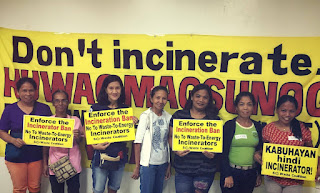Waste Pickers Seek Inclusion in Formal Waste Management Systems
National and local authorities should acknowledge and tap the immense potentials of waste pickers and the rest of the thriving informal waste sector (IWS) in reducing the country’s garbage production estimated at 40,087 tons per day.
The participants from Caloocan, Malabon, Manila, Navotas, Quezon and Valenzuela Cities and Meycauayan and Obando, Bulacan hail from the different sub-groupings of the IWS such as waste pickers in dumpsites and garbage transfer stations, e-waste dismantlers, door-to-door waste collectors, and itinerant waste pickers.
“We created this opportunity for the IWS representatives from various communities to meet and find strength in each other’s experiences and aspirations,” said Daniel Alejandre, Zero Waste Campaigner, EcoWaste Coalition.
At the forum, the IWS representatives eagerly affirmed their common goal to have decent, safe and secure jobs and livelihoods, and access to basic social services, including low-cost housing for the poor.
They emphasized the importance of the IWS, who are waste experts in their own right, in the development and implementation of solid waste management strategies and plans from barangay to the national level.
To achieve this, the participants pressed for the recognition of the IWS and their representation at the barangay solid waste management committees, provincial, city and municipal solid waste management boards and the National Solid Waste Management Commission (NSWMC).
Engr. Eligio Ildenfonso, Executive Director of the NSWMC, told the participants: “Huwag maliitin ang papel ninyo sa lipunan. May importanteng serbisyo kayo na dapat kilalanin ng mga pamahalaang lokal para mabawasan ang basurang itinatapon sa landfill na dapt ay latak lamang.” ("Do not underestimate your role in the society. You render an important service that local governments should recognize to reduce the volume of trash to be disposed of in landfills, which should be limited to residuals.)
Rey Palacio, also from the NSWMC, briefed the participants about the key features of the National Framework Plan for the Informal Sector in Solid Waste Management, as well as the National Solid Waste Management Strategy, in line with Republic Act 9003, the Ecological Solid Waste Management Act.
The forum also discussed the imminent threat to the IWS from waste disposal technologies that burn discards, including recyclables, in the guise of generating electricity.
“Our goal is to prevent recyclables from being wasted to feed the so-called waste-to-energy (WtE) incineration plants, undermining recycling efforts, and jeopardizing the economic livelihood of waste pickers and their families,” stressed Lora Abengoza, WtE Campaigner, EcoWaste Coalition.
The forum also sought to inform the IWS about the opportunities under Republic Act 10771, or the Green Jobs Act.
Reference:







Comments